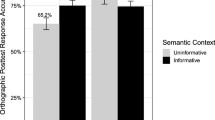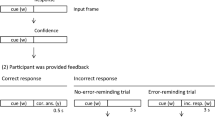Abstract
The present study asked whether accuracy feedback on a meaning generation task would lead to improved contextual word learning (CWL). Active generation can facilitate learning by increasing task engagement and memory retrieval, which strengthens new word representations. However, forced generation results in increased errors, which can be detrimental for learning if they are not corrected. The goal of this study was to determine whether immediate feedback on response accuracy would ameliorate this risk. The study was conducted using an intelligent tutoring system, which presents target words in multiple contexts and prompts users to generate a target word meaning after each context. One group of participants (feedback group) received immediate feedback based on Markov Estimation of Semantic Association (MESA), which estimates the distance between the learner response and the target word meaning. The control group did not receive feedback. Results from conventional (pre/post-test) measures showed greater gains in accuracy and confidence for the feedback group. Moreover, when contextual support was decreased mid-way through the training (from trial 3 to trial 4), MESA measures showed a corresponding drop in accuracy, but only for the No-Feedback group. These findings suggest that accuracy feedback can improve outcomes in CWL, particularly when there is an increased risk of errors. This strengthens the case for meaning generation as a tool to build high-quality lexical representations.




Similar content being viewed by others
References
Azevedo, R., & Bernard, R. M. (1995). A meta-analysis of the effects of feedback in computer-based instruction. Journal of Educational Computing Research, 13(2), 111–127. doi:10.2190/9lmd-3u28-3a0g-ftqt.
Baumann, J. F., Edwards, E. C., Font, G., Tereshinski, C. A., Kame’enui, E. J., & Olejnik, S. (2002). Teaching morphemic and contextual analysis to fifth-grade students. Reading Research Quarterly, 37(2), 150–176. doi:10.1598/rrq.37.2.3.
Beck, I., McKeown, M., & Kucan, L. (2013). Bringing words to life: Robust vocabulary instruction. New York: Guilford Press.
Bolger, D. J., Balass, M., Landen, E., & Perfetti, C. A. (2008). Effects of contextual variation and definitions in learning the meaning of words. Discourse Processing, 45, 122–149. doi:10.1080/01638530701792826.
Bourne, L. E, Jr., Dodd, D. H., Guy, D. E., & Justesen, D. R. (1968). Response-contingent intertrial intervals in concept identification. Journal of Experimental Psychology, 76, 601–608.
Butler, A. C., Karpicke, J. D., & Roediger, H. L. (2008). Correcting a metacognitive error: Feedback increases retention of low-confidence correct responses. Journal of Experimental Psychology: Learning, Memory, Cognition, 34(4), 918–928. doi:10.1037/0278-7393.34.4.918.
Butterfield, B., & Metcalfe, J. (2001). Errors committed with high confidence are hypercorrected. Journal of Experimental Psychology: Learning, Memory, Cognition, 27(6), 1491–1494. doi:10.1037/0278-7393.27.6.1491.
Cain, K., Oakhill, J. V., & Elbro, C. (2003). The ability to learn new word meanings from context by school-age children with and without language comprehension difficulties. Journal of Child Language, 30(3), 681–694. doi:10.1017/s0305000903005713.
Cain, K., Oakhill, J., & Lemmon, K. (2004). Individual differences in the inference of word meanings from context: The influence of reading comprehension, vocabulary knowledge, and memory capacity. Journal of Educational Psychology, 96(4), 671–681. doi:10.1037/0022-0663.96.4.671.
Carpenter, S. K., Pashler, H., Wixted, J. T., & Vul, E. (2008). The effects of tests on learning and forgetting. Memory & Cognition, 36(2), 438–448. doi:10.3758/MC.36.2.438.
Chaffin, R. (1997). Associations to unfamiliar words: Learning the meanings of new words. Memory & Cognition, 25(2), 203–226. doi:10.3758/BF03201113.
Chaffin, R., Morris, R. K., & Seely, R. E. (2001). Learning new word meanings from context: A study of eye movements. Journal of Experimental Psychology. Learning, Memory, and Cognition, 27(1), 225–235. doi:10.1037/0278-7393.27.1.225.
Collins-Thompson, K., & Callan, J. (2007). Automatic and human scoring of word definition responses. In C. L. Sidner, T. Schultz, M. Stone, & C. Zhai (Eds.), Proceedings of the human language technology conference of the North American chapter of the association of computational linguistics (pp. 476–483).
Collins-Thompson, K., Frishkoff, G., & Crossley, S. A. (2012). Definition response scoring with probabilistic ordinal regression. Proceedings of the International Conference on Computers in Education, 6, 101–105.
Durso, F. T., & Shore, W. J. (1991). Partial knowledge of word meanings. Journal of Experimental Psychology: General, 120(2), 190.
Efron, B., & Tibshirani, R. J. (1994). An introduction to the bootstrap. London: Chapman and Hall.
Elleman, A. M., Lindo, E. J., Morphy, P., & Compton, D. L. (2009). The impact of vocabulary instruction on passage-level comprehension of school-age children: A meta-analysis. Journal of Research on Educational Effectiveness, 2(1), 1–44. doi:10.1080/19345740802539200.
Francis, W. N., & Kučera, H. (1982). Frequency analysis of English usage: Lexicon and grammar. Boston: Houghton Mifflin.
Frishkoff, G., Collins-Thompson, K., Nam, S. J., Hodges, L. E., & Crossley, S. (2015). Dynamic support of contextual vocabulary acquisition for reading (DSCoVAR): An intelligent tutoring system for contextual word learning. In S.A. Crossley & D. S. McNamara (Eds.), Handbook on educational technologies for literacy (in press).
Frishkoff, G. A., Collins-Thompson, K., Perfetti, C. A., & Callan, J. (2008). Measuring incremental changes in word knowledge: Experimental validation and implications for learning and assessment. Behavior Research Methods, 40(4), 907–925. doi:10.3758/BRM.40.4.907.
Frishkoff, G. A., Perfetti, C. A., & Collins-Thompson, K. (2010). Lexical quality in the brain: ERP evidence for robust word learning from context. Developmental Neuropsychology, 35(4), 376–403. doi:10.1080/87565641.2010.480915.
Frishkoff, G. A., Perfetti, C. A., & Collins-Thompson, K. (2011). Predicting robust vocabulary growth from measures of incremental learning. Scientific Studies of Reading, 15(1), 71–91. doi:10.1080/10888438.2011.539076.
Frishkoff, G. A., Perfetti, C. A., & Westbury, C. (2009). ERP measures of partial semantic knowledge: Left temporal indices of skill differences and lexical quality. Biological Psychology, 80(1), 130–147. doi:10.1016/j.biopsycho.2008.04.017.
Grimaldi, P. J., & Karpicke, J. D. (2012). When and why do retrieval attempts enhance subsequent encoding? Memory & Cognition, 40(4), 505–513. doi:10.3758/s13421-011-0174-0.
Hintzman, D. L. (1990). Human learning and memory: Connections and dissociations. Annual Review of Psychology, 41(1), 109–139. doi:10.1146/annurev.psych.41.1.109.
Hintzman, D. L., & Curran, T. (1995). When encoding fails: Instructions, feedback, and registration without learning. Memory & Cognition, 23(2), 213–226.
Jenkins, J. R., & Dixon, R. (1983). Vocabulary learning. Contemporary Educational Psychology, 8(3), 237–260. doi:10.1016/0361-476X(83)90016-4.
Karpicke, J. D. (2009). Metacognitive control and strategy selection: Deciding to practice retrieval during learning. Journal of Experimental Psychology: General, 138(4), 469–486. doi:10.1037/a0017341.
Koriat, A., & Bjork, R. A. (2005). Illusions of competence in monitoring one’s knowledge during study. Journal of Experimental Psychology. Learning, Memory, and Cognition, 31(2), 187–194. doi:10.1037/0278-7393.31.2.187.
Lampinen, J. M., & Faries, J. M. (1994). Levels of semantic constraint and learning novel words. In Proceedings of the sixteenth annual conference of the cognitive science society: August 13–16, 1994, cognitive science program, Georgia Institute of Technology (pp. 530–536).
Loucky, J. P. (2013). TELL and CALL for ALL: Successful strategy use in second language learning. In Paper presented at the 2013 international conference on advanced ICT and education (ICAICTE-13).
Ma, Q., & Kelly, P. (2006). Computer assisted vocabulary learning: Design and evaluation. Computer Assisted Language Learning, 19(1), 15–45. doi:10.1080/09588220600803998.
McKeown, M. G., Beck, I. L., Omanson, R. C., & Pople, M. T. (1985). Some effects of the nature and frequency of vocabulary instruction on the knowledge and use of words. Reading Research Quarterly, 20(5), 522–535. doi:10.2307/747940.
Metcalfe, J., & Kornell, N. (2007). Principles of cognitive science in education: The effects of generation, errors, and feedback. Psychonomic Bulletin & Review, 14(2), 225–229. doi:10.3758/bf03194056.
Metcalfe, J., Kornell, N., & Finn, B. (2009). Delayed versus immediate feedback in children’s and adults’ vocabulary learning. Memory & Cognition, 37(8), 1077–1087. doi:10.3758/MC.37.8.1077.
Metcalfe, J., Kornell, N., & Son, L. K. (2007). A cognitive-science based programme to enhance study efficacy in a high and low risk setting. European Journal of Cognitive Psychology, 19(4–5), 743–768. doi:10.1080/09541440701326063.
Nash, H., & Snowling, M. (2006). Teaching new words to children with poor existing vocabulary knowledge: A controlled evaluation of the definition and context methods. International Journal of Language & Communication Disorders, 41(3), 335–354. doi:10.1080/13682820600602295.
National Reading Panel (U.S.), & National Institute of Child Health and Human Development (U.S.). (2000). Report of the National Reading Panel: Teaching children to read: An evidence-based assessment of the scientific research literature on reading and its implications for reading instruction: Reports of the subgroups. Washington, D.C.: National Institute of Child Health and Human Development, National Institutes of Health.
Pashler, H., Cepeda, N., Wixted, J., & Rohrer, D. (2005). When does feedback facilitate learning of words? Journal of Experimental Psychology. Learning, Memory, and Cognition, 31(1), 3–8.
Pashler, H., Rohrer, D., Cepeda, N. J., & Carpenter, S. K. (2007). Enhancing learning and retarding forgetting: Choices and consequences. Psychonomic Bulletin & Review, 14(2), 187–193. doi:10.3758/BF03194050.
Roediger, H., & Karpicke, J. D. (2006). Test-enhanced learning: Taking memory tests improves long-term retention. Psychological Science, 17(3), 249–255. doi:10.1111/j.1467-9280.2006.01693.x.
Schmidt, R. A., & Bjork, R. A. (1992). New conceptualizations of practice: Common principles in three paradigms suggest new concepts for training. Psychological Science, 3(4), 207–217. doi:10.1111/j.1467-9280.1992.tb00029.x.
Shute, V. J. (2008). Focus on formative feedback. Review of Educational Research, 78(1), 153–189. doi:10.3102/0034654307313795.
Stahl, S. A., & Fairbanks, M. M. (1986). The effects of vocabulary instruction: A model-based meta-analysis. Review of Educational Research, 56(1), 72–110. doi:10.3102/00346543056001072.
Taylor, W. L. (1953). “Cloze procedure”: A new tool for measuring readability. Journalism Quarterly, 30, 415–433.
Van der Kleij, F. M., Feskens, R. C., & Eggen, T. J. (2015). Effects of feedback in a computer-based learning environment on students’ learning outcomes: A meta-analysis. Review of Educational Research,. doi:10.3102/0034654314564881.
Walters, J. (2006). Methods of teaching inferring meaning from context. RELC Journal, 37(2), 176–190. doi:10.1177/0033688206067427.
Warmington, M., & Hitch, G. J. (2014). Enhancing the learning of new words using an errorless learning procedure: evidence from typical adults. Memory, 22(5), 582–594. doi:10.1080/09658211.2013.807841.
Wenger, S. K., Thompson, C. P., & Bartling, C. A. (1980). Recall facilitates subsequent recognition. Journal of Experimental Psychology: Human Learning and Memory, 6(2), 135. doi:10.1037//0278-7393.6.2.135.
Yonek, L. M. (2008). The effects of rich vocabulary instruction on students’ expository writing. Doctoral dissertation, University of Pittsburgh. Retrieved from http://d-scholarship.pitt.edu/9995/1/yoneklisa122008.pdf.
Acknowledgments
We thank Theresa Maglio, Christina Yarbrough, Elizabeth Dlouhy and Jonathan McNair for their assistance with stimulus development, and recruitment and running of participants. We thank MacKenzie Bechtel-Hall, Yu Meng, and John Grese for their contributions to the design and implementation of the ITS. This research was funded by a grant from the Language & Literacy Initiative at Georgia State. It was also funded in part by an IES grant (R305A140647, Collins-Thompson & Frishkoff) and by a gift from Microsoft Research.
Author information
Authors and Affiliations
Corresponding author
Appendices
Appendix 1
See Fig. 5.
Histograms showing bootstrap test results for changes in performance on the meaning-generation task from pretest to trial 6. Upper left H0: no difference in accuracy gains for Feedback and No-Feedback groups in the AllHi condition. Upper right H0: no difference in accuracy gains for Feedback and No-Feedback groups in the Mixed condition. Bottom H0: no difference in confidence gains for the two groups
Appendix 2
See Fig. 6.
Histograms showing bootstrap test results for changes in performance on the meaning-generation task from trial 3 to trial 4. Upper left H0: no difference in accuracy gains for Feedback and No-Feedback groups in the AllHi condition. Upper right H0: no difference in accuracy gains for Feedback and No-Feedback groups in the Mixed condition. Bottom left H0: no difference in confidence gains for the two groups in AllHi condition. Bottom right H0: no difference in confidence gains for the two groups in Mixed condition
Rights and permissions
About this article
Cite this article
Frishkoff, G.A., Collins-Thompson, K., Hodges, L. et al. Accuracy feedback improves word learning from context: evidence from a meaning-generation task. Read Writ 29, 609–632 (2016). https://doi.org/10.1007/s11145-015-9615-7
Published:
Issue Date:
DOI: https://doi.org/10.1007/s11145-015-9615-7






